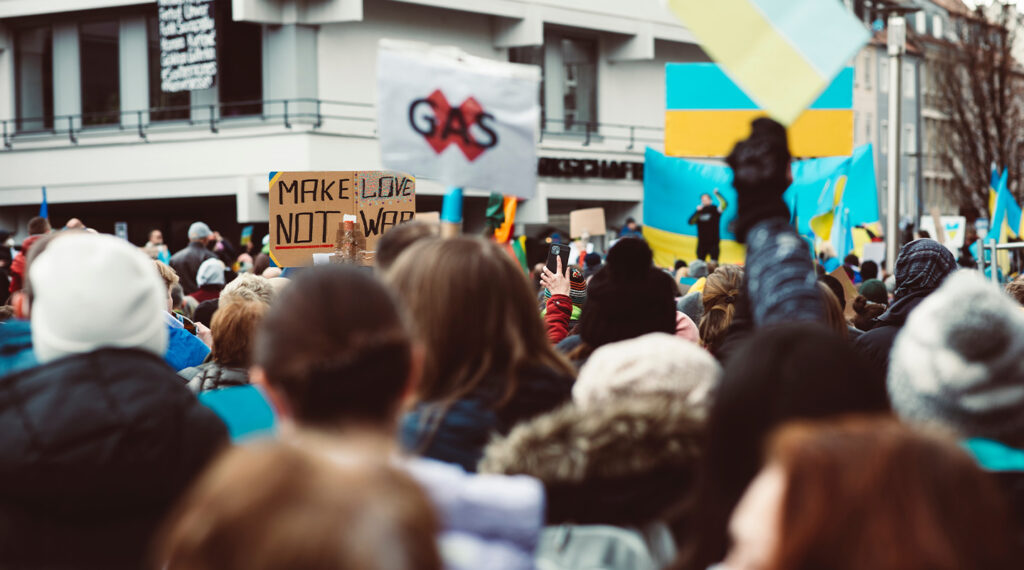Russia’s war in Ukraine is testing the European sentiment. So far, it holds!

On 9 May, Europe Day, the European Cultural Foundation (ECF) and European Council on Foreign Relations (ECFR) launched the second edition of the European Sentiment Compass. The survey, which annually assesses the state of European citizens’ and EU governments’ attitudes towards Europe, focused this year on the war in Ukraine and its impact on the way we – citizens and states – relate to Europe.
As the war ravages on, uncertainties and anxieties are perceptible in our daily lives and impacting our societies. The report reveals however, that despite – or because – of these many external and internal challenges, the European sentiment remains relatively strong and stable. With the exception of Hungary, and to some extent Poland and Bulgaria, most EU member state governments are pro-European. The governments of four countries (Czechia, Denmark, Slovakia, Slovenia) have in fact grown more attached to Europe over the past year, while Bulgaria has been the only one to show increased scepticism.
With the European Parliament elections on the horizon, it is reassuring that the European public and governments, with the exception of Hungary, remain strongly attached to Europe and stand united in their response to the war on Ukraine.
The EU has been supporting Ukraine with military and humanitarian aid worth billions since the outbreak of the war in February 2022. In June this year, the EU offered Ukraine 50 billion euros in aid for 2024-27 to secure short-term financing and the money to rebuild the nation. But how long will such support last? Will a “Ukraine fatigue” kick-in as other burning issues overshadow the atrocities taking place at our eastern borders?
Russia’s war in Ukraine is also forcing Europeans to confront some new and difficult questions about themselves. For example, they have shown much more solidary with Ukrainian migrants than they did with those from Syrians eight years ago. How should this be interpreted?
Putin and his war are challenging Europe’s commitment to openness, diversity, freedom, and solidarity. The EU and its member state responses will significantly influence citizens’ attitudes inside Europe and their image abroad. Their collective and individual actions will either reassert or undermine European values, and thereby their credibility and legitimacy.
The European sentiment, a sense of sharing common values, a common space and a common future, will be further put to the test in the months ahead. Russian disinformation as well as the cost-of-living crisis and concerns about migration will all play a role in undermining it and deeply affecting our esteem for and relationship with Europe.
It is therefore good that the EU and member state leaders are taking measures to tackle these threats. However, there are other issues of concern that are not given enough attention, which bear a high risk of eroding our sense of togetherness and solidarity.
What is underestimated are risks to our attitudes and actions vis-à-vis Russian culture, media, and citizens. On this, the EU and member state leaders are facing various dilemmas. Should they restrict the presence of Russian culture as a sign of solidarity with Ukraine? Should they clamp down on Russian media in the EU27? Should they impose a travel ban on all Russian citizens? Should they consider Russians as collectively responsible for the war?
What is clear, is that the EU and member state leaders need to regain confidence in liberalism and in their own citizens. What does this mean concretely?
Firstly, the issue of how to deal with Russian culture in Europe is one that should be approached with caution. As long as the war is ongoing, there should be no space for Russian artists who are to any extent related to the Russian state. However, the entirety of Russian culture should not be put on hold. “Cancelling” Russian culture is not only contrary to European values, but would also prevent artists and cultural institutions from exploring how to make culture useful in times of war. Indeed, rather than exerting such extreme measures, European authorities should actively support the Ukrainian culture – now and in the years to come.
Secondly, the EU and its member states should also demonstrate that they are supporters of pluralist debate. Disinformation is part of Russia’s military doctrine and our response should focus not only on defensive measures against propaganda platforms, fake news, dis- and misinformation, but also on strategic and long-term investment in education, culture, media and digital literacy.
Finally, European leaders should resist the temptation of using a black-and-white rhetoric – and instead see people as allies. They should acknowledge that not all Russians bear the same responsibility for war, and that Belarusian citizens are not the same as Lukashenko’s regime, which collaborates with Putin.. In fact, public and private actors in the EU, including philanthropic leaders should support and nourish a culture of resistance in Russia and Belarus, both inside and outside these countries. Many Russian and Belarusian citizens may prove useful allies in ending the war.
The war in Ukraine is not just a challenge for European security, it is also putting Europe’s commitment to openness, diversity, freedom, solidarity, and individual responsibility to the test. With the world’s second biggest elections – in the European Parliament – taking place next year, what’s at stake is not just Europe’s image at home and abroad, but also our attachment to Europe, the fundamentals of our democracy and the warrant of our unity.
Authors


